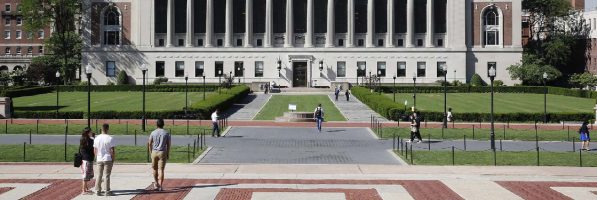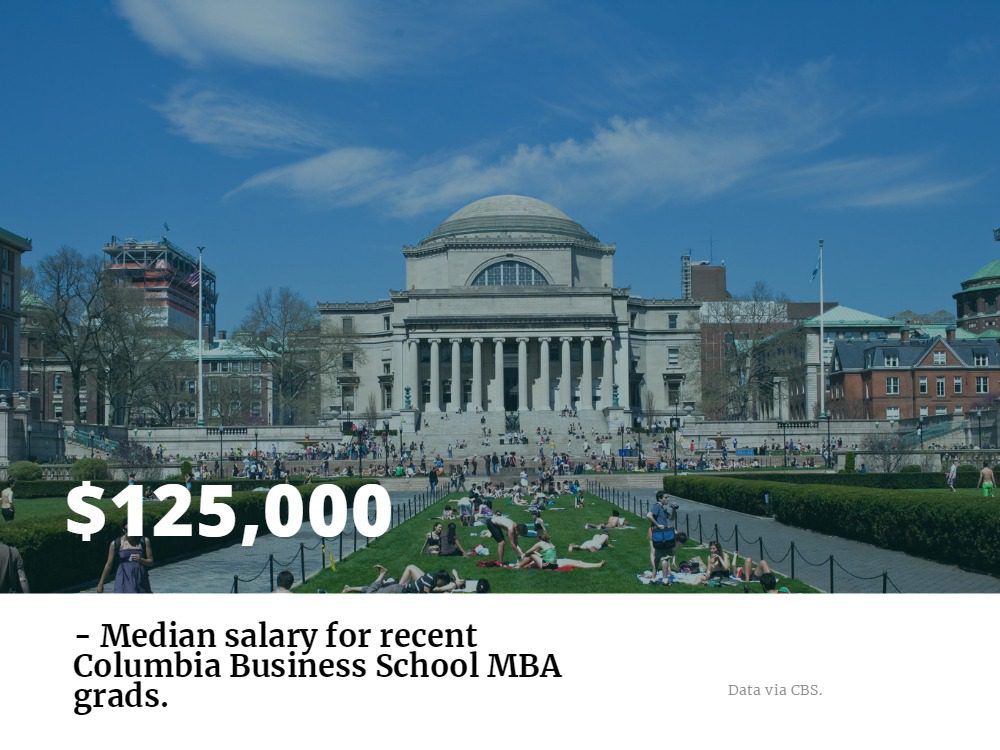Columbia Business School Reveals 2018-19 Essays and Deadlines

Right after the eve of graduation, Columbia Business School formally introduced its newest essays and deadline dates for the upcoming 2018-19 academic year.
Columbia Business School MBA Essays (2018-19)
Goal: What is your immediate post-MBA professional goal? (50 characters)
Essay #1: Through your resume and recommendations, we have a clear sense of your professional path to date. What are your career goals over the next 3-5 years and what, in your imagination, would be your long term dream job? (500 words)
Essay #2: How will you take advantage of being “at the very center of business”? CBS urges those undertaking essay number two to watch this video from Dean Glenn Hubbard (250 words).
Essay #3: Please provide an example of a team failure of which you have been a part. If given a second chance, what would you do differently (250 words)?
Optional Essay: What else would you like to tell the Columbia admissions committee? You can use this space to provide your explanation if there any areas of concern in your own academic or personal history. This essay does not need to be traditionally formal and can include bullet points (maximum 500 words).
Columbia Business School MBA Deadlines (2018-19)
Early Decision (January) – October 3, 2018
Merit-Based Deadline – January 4, 2019
Final Regular Decision – April 10, 2019
Forced Good Behavior Isn’t Good, According to Columbia – New York News

Let’s explore some of the most interesting stories that have emerged from New York City business schools this week.
Columbia Business School: Mandated Corporate Good Behavior Hurts Bottom Line & Reduces Efforts to “Do Good” – CBS Newsroom
New research from Columbia Business School professor Shivaram Rajgopal finds that mandatory Corporate Social Responsibility as a business practice is a “value-decreasing proposition for shareholders, and a disincentive for corporate good behavior.”
Raigopal writes, “Our findings prove that CSR is counterproductive when governments get involved. In developing an effective method for measuring CSR’s impact on business we were able to prove that CSR only has value if it is a voluntary activity. Shareholder value decreases as mandatory CSR increases. In fact, mandatory CSR is, in effect, nothing more than an inefficient backdoor tax on private sector.”
You can read more about Raigopal’s research here.
Introduction of Craigslist Increased Prostitution Across U.S. – Experience Stern
New research from NYU Stern School of Business and the University of Minnesota’s Carlson School of Management finds that “as Craigslist expanded across the United States, the free classifieds website also bolstered the sex industry,” which co-author Anindya Ghose, the Heinz Riehl Professor of Business at the Stern School, explains is “made up of both independent sex workers and workers operating under commercial vice groups.” In fact, Craigslist’s entry into a county increased prostitution cases—both “transactions by existing sex workers, as well as prompted recruitment and coercion of new ones”—by 17.58 percent.
The data was revealed in the recently-released study “The Digital Sin City: An Empirical Study of Craigslist’s Impact on Prostitution Trends”, which was “based on analysis of national panel data for 1,796 U.S. counties from 1999 to 2008.”
You can read more about the study here.
Lonely and Non-Empathetic People More Likely to Make Unethical Shopping Decisions – Binghamton SOM
New research from Binghamton SOM assistant professor of marketing Jenny Jiao finds that lonely consumers “very often behave immorally. And while these behaviors are often legal, they are unethical and cost retailers billions each year.”
She cites the common example of ‘wardrobing’ in which “someone may buy a big-screen TV for Super Bowl Sunday, only to return it on Monday; or they may buy a nice outfit for a night out, only to return it the next day.”
In Jiao’s paper, “Can Lonely People Behave Morally? The Joint Influence of Loneliness and Empathy on Moral Identity,” which was recently published in the Journal of Consumer Psychology, she was interested in how much of a factor loneliness played in this type of consumer behavior.
“We found that lonely people are capable of empathizing and making moral decisions, but they may not have the intention or motivation to. But when empathy levels increase, we don’t see much difference between lonely people and non-lonely people. Lonely people will be more likely to engage in moral behaviors and less likely to engage in immoral behaviors when they feel empathy.”
Read more about Jiao’s research here.
What are the Best Healthcare MBAs You Can Find in New York City?

New York City is not only home to a number of the finest business schools in the world—it’s also where you can find some of the best healthcare programs this country has to offer. Continue reading…
A Look At New York’s Best Real Estate MBA Programs

In 2017, the United States Commercial Real Estate Services group (CBRE), listed New York City’s real estate investments markets among the three largest in the world, sandwiched between Tokyo and Los Angeles. This makes New York City the perfect place to learn about the multi-faceted, constantly-evolving field of real estate. For aspiring MBA’s interested in pursuing real estate, we’ve laid out some of the best New York real estate MBA programs the metro has to offer.
The Best New York Real Estate MBA Programs
Columbia Business School
The oft-celebrated Columbia Business School MBA Real Estate Program emphasizes finance and investment management, headquartered at the Paul Milstein Center for Real Estate. There, according to the school, students will gain an education focused on “capital markets, entrepreneurship, and global business.” Since many of Columbia’s alumni remain in New York metro, the school has access to a large network of professionals to engage in speaking events, panels, and mentorship with current students. Students in this program must take Real Estate Finance, which the school considers the Real Estate program entry course. Students then take nine credits of real estate electives.
The Real Estate Private Equity class lets students gain real-world experience. Groups of students work with industry sponsors to develop a business plan and present their final projects to a panel of professionals. Given the hands-on private equity and investment experience provided by this course, it makes sense that in 2017, 46 percent of students who graduated from the MBA Real Estate program went on to careers in Investment Management/Private Equity.
Nearly 4 percent of the most recent MBA class from CBS entered the New York real estate industry, earning a median income of $120,000 per year and, of course, heavy amounts of extra compensation. These graduates earned positions at notable real estate firms, such as: Drake Real Estate Partners, GLL Real Estate Partners, Greystar Real Estate Partners, LLC, Summit Real Estate Group, LLC, TKF Real Estate Investment LLC, and Trilogy Real Estate Management.

SC Johnson Graduate School of Management – Cornell University
At the Cornell University SC Johnson Graduate School of Management, students can pursue a dual degree in real estate and business administration. The MPS in Real Estate/MBA is a collaboration between Cornell SC Johnson’s School of Hotel Administration and Johnson. The dual degree spans six semesters (three years), and includes two summer internships. The first year of the degree is in either the real estate program or the MBA program, but students can take courses in both programs in the following semesters.
Students pursuing real estate at Cornell benefit from access to the the Cornell Real Estate Council, which the school promotes as “one of the largest university-based networks of real estate professionals in the world.”
YOU MAY ALSO LIKE: Finding the Best Real Estate MBAs in Los Angeles
Rutgers Business School, Newark and New Brunswick
The Real Estate Concentration at the Rutgers Business School in Newark and New Brunswick, New Jersey, has several objectives. The curriculum is geared toward arming students with the ability to assess investment risks in real estate markets, determine the best way to utilize a property based on market and demographic information, and gain a thorough knowledge of the legal intricacies involved in real estate. In addition to their elective and core MBA courses, b-schoolers with a real estate concentration are required to take the following courses: Aggregate Economic Analysis, Real Estate Development, Real Estate Law, and Real Estate Finance.
Stern School of Business – New York University
Any discussions of the best business schools in New York metro, and perhaps the world, are likely to include mention of the NYU Stern School of Business. Stern’s MBA with a Real Estate Specialization helps students understand the intricacies of real estate markets, financing real estate projects, real estate development, and managing real estate investments. The curriculum includes courses like: Real Estate Development and Entrepreneurship, Urban Systems, and Real Estate Investment Strategies.
One major perk of Stern’s program is its flexibility; Stern MBA’s can select up to three specializations, so students are not limited by their choice. Real estate is a vast field, with a multitude of facets. MBA’s interested in New York real estate might choose a secondary specialization to complement their specific interests, such as entrepreneurship and innovation or marketing.
Why McKinsey & Company Loves Hiring MBAs

McKinsey & Company is considered one of the most prestigious management consultancy firms in the world, with a clientele that includes 80 percent of the world’s largest corporations, along with an extensive list of governments and non-profit organisations. The firm is also a prestigious landing spot for MBAs following graduation. Continue reading…
Zicklin MBA Ranking Jumps in US News, and More – New York City News

Let’s explore some of the most interesting stories that have emerged from New York City business schools this week.
U.S. News & World Report Names Baruch College Among Nation’s 2019 Best Graduate Schools – Zicklin News
The Baruch College Zicklin School of Business knocked it out of the park in the recently revealed U.S. News & World Report “2019 Best Graduate Schools” list. The full-time MBA ranked 55th nationwide (moving up two spots from the previous year), 29th nationwide among public institutions, first among public institutions in both NYC and New York state, 3rd in NYC overall, and 5th in New York State overall.
The business school’s part-time MBA also ranked 56th nationwide (a 22-spot jump from last year’s list), 34th nationwide among public institutions, first among public institutions in both NYC and New York state, 3rd in NYC overall, and 3rd in New York state overall. Willem Kooyker, Dean of the Zicklin School of Business Dr. H. Fenwick Huss, Ph.D., said in a release:
“Graduates of the Zicklin School of Business lead major businesses around the globe. Our student success is based on an ever-evolving curriculum that today includes data science and analytics, machine learning and cybersecurity along with experiential learning opportunities for real-world problem solving and strategic planning.”
Read more about Zicklin’s showing in the US News & World Report rankings here.
Living Abroad Leads to a Clearer Sense of Self – Columbia Business School Blog
Social scientists from Columbia Business School, Rice, and UNC universities have recently published new research in the journal Organizational Behavior and Human Decision Processes that finds how “living abroad increases “self-concept clarity.”
The findings came after the group surveyed roughly 2,000 “participants from online panels and United States and international MBA programs” that had, at one point, studied abroad.
Entitled “The Shortest Path to Oneself Leads Around the World: Living Abroad Increases Self-Concept Clarity,” the study reveals that “living abroad triggers self-discerning reflections in which people grapple with the different cultural values and norms of their home and host cultures. These reflections are helpful in discovering which values and norms define who people are and which simply reflect their cultural upbringing.”
You can check out the rest of the study here.
Goldman Sachs Executive Recounts Journey to Success in Finance – Gabelli Connect
Goldman Sachs President and Co-Chief Operating Officer Harvey M. Schwartz used his recent Fordham Wall Street Council talk as an opportunity to discuss his unlikely journey from a post-high school gym employee to Wall Street innovator as he stands on the precipice of retirement.
“Innovation is present in financial services. I think that if you have an interest in solving complex problems for clients or specific areas of markets, there is a unique way to participate. The takeaway should be that if you work hard, people will invest in you.”
Glean more wisdom from Schwartz’s talk here.
